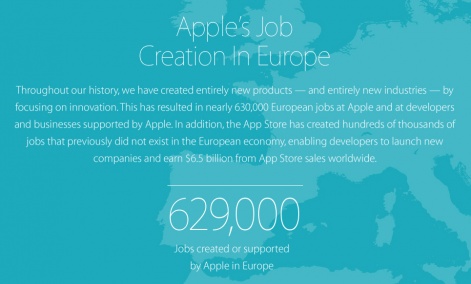The "app revolution" kickstarted by the launch of the App Store in 2008 has added half a million new jobs to the European economy, Apple has claimed, with iOS leading the way.
That's according to a rush of stats released by the Cupertino giant, which claims that – across the board – Apple has either created or supported 629,000 jobs across the continent.
The numbers, published on a dedicated page on Apple's website, claim "approximately 50 percent of all direct and indirect app economy jobs in EU28 can be directly attributed to iOS."
Money matters
In all, Apple has paid more than $65 billion to developers across Europe, which accounts for more than a quarter – 30 percent, to be exact – of all the revenue generated by developers on iOS.
"Apple has been active in Europe for decades and now directly employs more than 16,000 people, having added 5,000 new jobs since 2011 we now have full time employees in 19 European countries," the firm added in a statement.
"In Cork, where our business is headquartered we have around 4,000 people in a range of roles, including supply chain and risk management operations, manufacturing and customer support. Our 101 Apple Retail Stores draw hundreds of thousands of customers monthly to malls and high streets across 8 European countries - UK, Spain, Italy, France, Germany, Netherlands, Sweden, Switzerland - benefiting local businesses in each location."

The figures appear to be derived from a report on the European App Economy published by Vision Mobile, which – amongst other figures – claims there are 406,000 professional app developers across the European Union.
You can read Apple's insight in full here.
You can find more app data over on our App Store Metrics page.




















